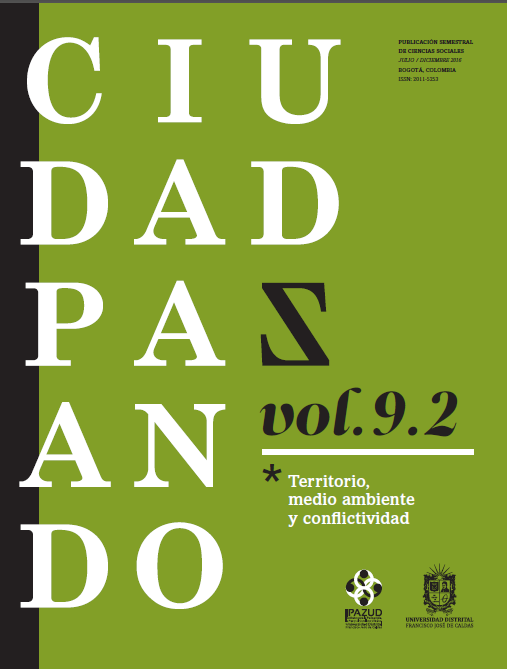DOI:
https://doi.org/10.14483/udistrital.jour.cpaz.2016.2.a08Published:
2016-12-26Issue:
Vol. 9 No. 2 (2016): Julio - diciembre. Territorio, medio ambiente y conflictividadSection:
Voces OtrasDemocratización del conflicto desde la escuela
Democratization of conflict from school. Notes on peace education.
Keywords:
paz, educación, conflicto, pluralismo, constitución, derechos humanos, diferencia (es).Keywords:
peace, education, conflict, pluralism, constitution, human rights, difference (en).Downloads
Abstract (es)
En el presente artículo se intenta reivindicar a la institución escolar como uno de los escenarios que más podrán contribuir al logro y a la sostenibilidad de los procesos que tienden a realizar la paz en el país. Se construyó bajo la concepción de que la única vía para la paz es el reconocimiento del conflicto como un elemento inherente a las relaciones humanas, en las que el sujeto se diferencia y se posiciona frente al otro. Se muestra cómo la escuela desde su función como mecanismo de sintonización histórica del sujeto y de difusión de los parámetros normativos de la sociedad, como de los logros científicos
y académicos de la humanidad, puede llegar a reivindicar la diferencia y a defenderla como foco de construcción de la realidad, para evitar reducirla a una verdad única y universal, de la que históricamente han derivado los más grandes conflictos de la sociedad.
Abstract (en)
This article attempts to vindicate the school system as one of the scenarios that the more they can contribute to the achievement and sustainability of the processes that tend to make peace in the country. It was built under the conception that the only way to peace is the recognition of conflict as an inherent element of human relations, in which the subject is difference and positioned opposite each other. It shows how the school from its function as a mechanism of historical tuning of the subject and dissemination of normative parameters of society, as scientists and academics of humanity achievements, you can get to claim the difference and to defend it as a focus of building indeed, to avoid reducing it to a single universal truth, which historically have derived the greatest conflicts in society.
How to Cite
APA
ACM
ACS
ABNT
Chicago
Harvard
IEEE
MLA
Turabian
Vancouver
Download Citation
License
The Ciudad Paz-ando Journal (RCP) is an open access publication, without economic charges for authors or readers, whose biannual publications are made under the terms of the Creative Commons Attribution - Non-commercial - Share the same License (CC-BY-NC -SA 2.5 CO), with which others may distribute, remix, retouch, and create from the work in a non-commercial way, as long as they give credit and license their new creations under the same conditions.
The copyright holder is Ciudad Paz-ando journal, retaining all rights without restrictions, respecting the terms of the license regarding the consultation, download and distribution of the material.
When the work or any of its elements are in the public domain according to the applicable current law, this situation will not be affected by the license.
Likewise, we encourage authors to deposit their contributions in other institutional and thematic repositories, with the certainty that culture and knowledge is a good for all and for all.

